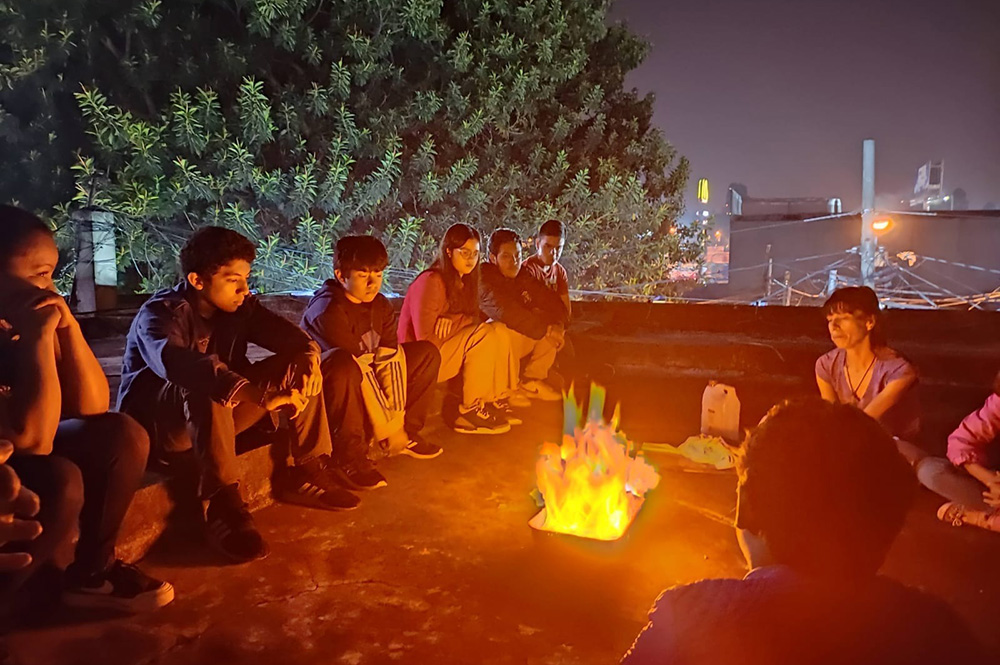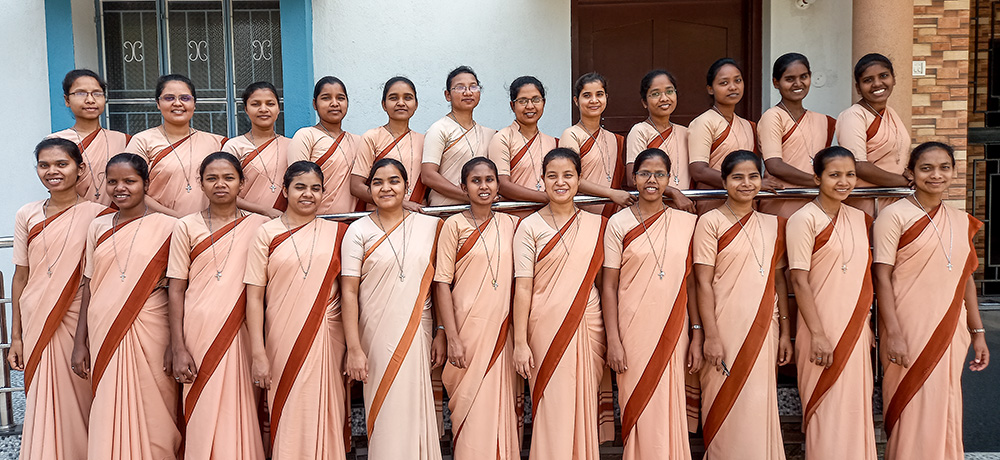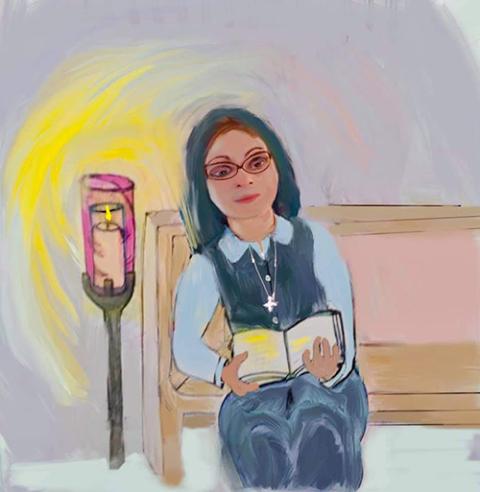
A depiction of Jesus is seen in a detail from a 12th-century Spanish fresco. (Metropolitan Museum of Art)
Since the time of the Desert Mothers and Fathers, people have been drawn to a life devoted to God, and many have followed. However, as the number of consecrated religious dwindles, many questions arise in our hearts: What are the indicators that one is living authentically, ensuring that our actions align with our stated commitment?
This month our panel explores the question: How might living authentically attract others to religious life? Does it?
______

Nancy Mancera is a Colombian missionary with the Verbum Dei Missionary Fraternity. She studied theology in Guadalajara, Mexico, and earned a degree in dogmatic theology from the Gregorian University in Rome. She has been involved in apostolic work in countries that include Mexico, Colombia, Belgium, Italy and Guatemala, serving diverse populations from children to adults. She has also established radio programs at the diocesan level to support apostolic group formation and conducted retreats for teenagers and university students. She currently lives in Guatemala.
When I read the expression living authentically, I remembered Martin Heidegger and his reflections on authentic existence. According to him, one of the characteristics of such existence is that it is conscious of death. Interpreting the phrase in an evangelical sense, an authentic existence lives in the world without being of the world (John 17:11-14).
For this reason, I find that our attractiveness cannot be of this world either. What attracts people to religious life does not make much noise like the advertising campaigns of our time, nor does it have the magnetism of what this world promotes.
People are drawn to something hidden from the eyes, the mystery that surrounds our vocation: Jesus and what identifies us with him.
Years ago, I worked giving retreats to teenagers from very well-off families. When I tried to introduce them to the spiritual experience, I encountered resistance and, in some cases, even apathy.
However, the psychologist who invited us said, "Even though they show these attitudes, they are greatly impacted by your lives, seeing you simple, free, with the patience and love you have for them. That really catches their attention!"
I believe that is the price of authenticity! Authenticity has no place on the "walk of fame."
Recently, one of the girls in the group I work with told her mother that she wanted to be a missionary. What surprised me most about the girl's interest was the context in which it arose. We are currently in the process of closing the community where I have been working for the past three years (with everything that entails). Questions arise within me, such as: Have we done things right? There is the frustration of having to close down a ministry after 27 years of labor.
However, the girl senses that she wants to dedicate her life to doing what we do. What does she see? What attracts her? What does she perceive?
Perhaps she perceives Jesus, whom she has discovered in our chapel, along with joy when she comes to activities, affection, smiles, creativity, closeness.

Nancy Mancera spends time with a group of teenagers on the rooftop of the sisters' house during their farewell on April 06 in Guatemala City, Guatemala. Reflecting on the Resurrection story in John 21, the sisters assured the teens that although they are leaving the city, Jesus will always be with them. (Rosa Nima)
What attracts people to us is not exactly the apostolic successes we may have, nor the impact we generate on social media. People are drawn to something hidden from the eyes, the mystery that surrounds our vocation: Jesus and what identifies us with him.
For all these reasons, I am left with an invitation: I will not forget the essential! The attractiveness has more to do with the cross than with the glitter of this world. This means: How do we integrate our struggles, fragilities, failures with the hope that Jesus offers us?
Interpreting Heidegger: Our authenticity is manifested in not living oriented toward what perishes, but toward the mystery that is our life hidden with Christ.

Mary Karuna Matthew is a native of India and is affiliated with the Congregation of the Sisters of Notre Dame of Coesfeld, Germany. Her areas of specialization include education, theology, formation and psychology. With a wealth of experience in education and formation, she currently serves as part of the general administration, where she oversees the congregation's formation program. She lives in Rome.
Religious life is a radical commitment to following Jesus and living out his teachings. It involves a transformative encounter centered around divine love. However, many congregations face a crisis due to declining new vocations. The decrease in new vocations is particularly concerning, as it reflects broader societal shifts, changes in family structures, and the difficulties of living a religious life in an increasingly secular world.
Our traditional religious practices may not effectively engage young people today due to a lack of relevance to modern society. To connect with youth, we must communicate credibly and witness authentically. Living an authentic life is crucial to encourage religious vocations.
Jesus is a paramount example of authentic living. As his followers, we can inspire others by genuinely living out our faith-filled lives. Authenticity requires courage, vulnerability, transparency, and integrity. The 1965 Vatican decree Perfectae Caritatis says, "Religious should remember there is no better way than their own example to commend their institutes and gain candidates for the religious life."
To connect with youth, we must communicate credibly and witness authentically. Living an authentic life is crucial to encourage religious vocations.
As a religious, living authentically involves consistent and congruent actions with one's commitment to religious life. Authenticity can be identified through various indicators.
For example, showing genuine joy in living one's vocation. This joy derives from a profound connection with Jesus and is a powerful testament to the beauty and richness of a life devoted to serving God and others. This joy is also infectious and can draw others to it.
Another indicator is the display of radicality and courage in going against the current and challenging social norms while fully embracing the demands of the Gospel. Such an unwavering commitment to Christ's teachings can inspire individuals seeking a more profound sense of purpose and meaning in life.
Authentic religious life is characterized by openness to dialogue, active listening, and a willingness to learn from others. This approach creates an inclusive environment that is inviting to individuals who are contemplating their vocational callings.

Sisters of Notre Dame in Patna, India (Courtesy of Karuna Matthew)
Prayer and discernment are crucial practices that are fundamental to authentic religious life.
Compassion and proximity to people, particularly the poor, marginalized, and on the periphery of society, are essential to authentic religious life. Such a compassionate presence can attract individuals interested in making a significant impact.
A simple and humble lifestyle can indicate an authentic life. This lifestyle emphasizes that religious life is not about power or social status but about loving God and serving others.
In conclusion, authentic religious life can attract new vocations because they are drawn to the genuine witness of love, joy and service that characterizes those truly committed to following Jesus.

Margaret Kerry, a Daughter of St. Paul, served as director of the lay Association of Pauline Cooperators for 15 years. For most of her 45 years of religious life, she was missioned to Pauline Books and Media Centers, serving as volunteer coordinator, outreach coordinator, manager and superior. For six years, she served in the provincial government as councilor for the apostolate. Her studies were in organizational development at DePaul University in Chicago and a master's in pastoral theology and ministry at Boston College School of Theology and Ministry. During studies, she initiated inner-city reading rooms for afterschool programs in collaboration with the Volunteers of America (New Orleans) and the Boys and Girls Clubs (Chicago), and began a reading program at Horizons for Homeless Children (Boston).
Being authentic means being genuine and real. Women and men are drawn to religious life because Jesus is authentic.
St. Peter wrote that Jesus left us an example, so we can follow in his footsteps, "He committed no sin, and no deceit was found in his mouth. When they heaped abuse on him, he did not retaliate; when he suffered, he made no threats, but entrusted himself to him who judges justly" (1 Peter 2:22-23).
Jesus lived in perfect fidelity to the Father, "When you see me you see the Father" (John 14:9). When Jesus tells us that he is the Truth, the Hebrew word used is emeth, meaning fidelity or faithfulness. There is a rich biblical tradition that associates emeth with hesed (steadfast love or mercy). Truth reflects who God is rav chesed ve-emet, abundant in loving-kindness and truth.

Self-portrait by Daughter of St. Paul Sr. Margaret Kerry (Courtesy of Margaret Kerry)
Zechariah 8:16 tells us that to be authentically like God we are to speak the truth to each other. In Ephesians 4:25, St. Paul reminds us to be renewed in God's image, in honesty and holiness that comes from truth. He reminds us to be authentic and speak the truth to our neighbor because we are members of one another.
In Jesus's Aramaic, the word for truth means clarity coming from the heart that leads one in the right direction. Following Christ is not outward imitation, since it touches us at the very depths of our being (Veritatis Splendor).
In today's postmodernism, being true to yourself often means shutting out others. The idea that truth is objective and fluid and my possession, "my truth," obscures authenticity. Since no one can tell me who I am or if I am authentic, the false and empty self can easily cover our truest identity.
Only Jesus, the Truth, can help us discover and become who we are meant to be. Religious attract vocations when they follow Jesus and live from their true self where Christ dwells in the Spirit (Colossians 3:1-11). Christ becomes our new identity, our appearance in the world.
Blessed James Alberione wrote, "The apostle exudes God from all her pores: with word, work, prayer, gestures, attitudes in public and in private; she gives her entire being."
A religious who is truly in love with God is free to be authentically herself in Christ.
A religious comes out of herself, dropping all façades, through the evangelical counsels lived authentically: enacting poverty freed from possessiveness, being obedient to God and being attentive to that person in front of her, loving others chastely and selflessly. Being true to her authentic self she inspires others to respond to the grace of a religious vocation.
A religious who is truly in love with God is free to be authentically herself in Christ. Living in community, she finds other sisters who awaken areas in her life that challenge any way that she may live inauthentically.
Her life as it is, with its imperfections and struggles, prayerful trust, joys, witness to beauty, acts of goodness and acceptance of her humanity — all adding up to authenticity — is attractive since it points to a lived relationship with God.

Edith Eneh is a member of the Sisters of Notre Dame de Namur, Province of Nigeria. Since her profession in 2011, she has worked as a bursar in various schools for eight years. Currently, she works in her province's development office.
In every career or profession, there is always an attraction for those who seek to be part of it, and religious life is not an exception.
I remember, as postulants, we were asked to share what attracted us to religious life. People shared many stories of qualities and experiences that spoke to their inner desires and moved them to join the Sisters of Notre Dame de Namur. In those stories, we discovered that the life the older religious lived impacted us positively and propelled our desire for good Christian living toward religious life.
As a zonal coordinator of aspirants in my unit, I have always asked young women who aspire to religious life what's attracting them to religious life and/or the congregation of the Sisters of Notre Dame de Namur.
Most of the time I get answers like, "I like the way the sisters pray, their love and faith in God, the way they comport themselves in public, their simple dressing, their generous sense of hospitality, and their love for the people of God, especially the poor and the way they take care of the poor."

Notre Dame de Namur Srs. Augustina Onyebuchi (left) and MaryBernedette Eboh (right) with some aspirants after one of their seminars (Courtesy of Edith Eneh)
Living authentically as a religious is being a "living Gospel" for the people around us. People "read" our actions and manner of living and are convinced to follow Christ as Christians or in religious life.
To show that a religious is living authentically, she has to be committed to the evangelical vows she took — vows of obedience, chastity and poverty. The indicators that outwardly show that we are committed to our vows are usually shown in our charism and spirituality. The Sisters of Notre Dame de Namur have the charism of "making known God's goodness" that is exemplified in our way of living.
Prayer is the key to the life of every religious. It is the crown of other values in religious life; without prayer, we cannot live the life. According to Pope Francis, on the World Day of Consecrated Life in 2016, "The 'marrow' of consecrated life is prayer."
Without prayer, I do not think we would be able to sustain living this life. It is our nourishment. Every sister of Notre Dame devotes quality time to commune with God aside the community time for prayer.
Simplicity is another value we live out that has attracted people to religious life. It is not only in dressing (we do not have a habit) but also inwardly. This ranges from our government structure, our simple style of dressing, respect and acceptance of people irrespective of color or race.
When we interact with people, we consciously and unconsciously communicate our deep and rooted faith in Christ, and this often leaves a positive imprint of Christ's love on humankind.
The welcome one gets at the first visit of a place always leaves a lasting impression on the visitor. The sisters leave an open door for the visitors who come knocking on their door, whether invited or uninvited. Each visitor is warmly welcomed and attended to.
Religious life is usually synonymous with a deep faith in God, our spouse — the caller. Without faith in God who calls, the called cannot live the life.
This faith is communicated to the outside world verbally and in our actions. When we interact with people, we consciously and unconsciously communicate our deep and rooted faith in Christ, and this often leaves a positive imprint of Christ's love on humankind. It sometimes attracts people to religious life, especially those who once felt neglected by God.
Commitment and dedication in our ministries is vital. People we work and associate with in our ministries and other public places often look up to us, sometimes without our awareness. Being committed and devoted to our charism and spirituality, and living it out in our communal and ministry, life inspires young people to consider religious life. They see us as role models and seek direction from us.
Advertisement
When we put in the best of our life at the service of the poor, whether in education or health care, people are usually amazed. This dedication makes young ones admire us and want to follow in our footsteps.
Religious life is modeled after the life of Christ, who is the sole model for the religious. Christ's life attracted many followers apart from his apostles he called personally. None of those he called declined; they all answered his call. People were attracted to him not just because of his miracles but also by the way he lived.
May his life continue to inspire us to live authentically so as to attract others to religious life.

Patricia Wittberg is a Sister of Charity of Cincinnati. She holds a doctorate in sociology from the University of Chicago, and she taught the sociology of religion and religious organizations for 30 years at Fordham University and Indiana University (Indianapolis). She currently administers her congregation's Seton Enablement Fund, which gives low-interest loans to nonprofit organizations that help poor and marginalized people. She is also a research associate for the Center for Applied Research in the Apostolate, or CARA, at Georgetown University.
Somewhere around 10 or 15 years ago, a new device — the smartphone — entered our lives. Almost immediately, critics began to fret that this was not a good thing, especially for adolescents.
Jean Tweng, an American psychologist who researches generational differences, noted teens were spending only half the amount of time getting together with their friends that teens had spent before smartphones were introduced. This meant, she said, that they were spending less time "building social skills, negotiating relationships, and navigating emotions." And the more time they spent on social media with their phones, the less happy they were.
Why might this be? According to Sherry Turkle in her 2017 book Alone Together, when we regularly spend time in person with people, we mutually develop a fuller appreciation for each other in all aspects of our personalities.
In contrast, interacting primarily online allows us to edit and curate the image we present. We remove or drastically filter all the information we might get by being with someone in person. All we see of others — and all we allow them to see of us — is the "happy face of success."

(Unsplash/Paul Hanaoka)
Today, this seems to be getting worse. Commentators, psychologists and even the U.S. surgeon general are warning that all of us — teens and young adults especially — are becoming lonely and anxious to an unhealthy degree. We have few — if any — persons with whom we feel we can be our authentic selves, who know our quirks, talents, and growing edges and love us anyway.
This means that many of us have few — if any — persons who image God's unconditional love for us.
Women religious are called, I believe, to do precisely that. Our experiences in Ignatian discernment, spiritual direction, centering prayer, and simply living community continue to train us in being open and authentic before God, each other, and all those we meet. There is such a deep hunger for this authenticity among teens and young adults today.
This presumes, of course, that we are really living this authenticity. Those we meet will quickly see through our façade otherwise. If we profess to practice charity, community, simple living and/or nonviolence while manifesting the opposite in our daily living, we may deceive ourselves, but young people who might have felt called to religious life will dismiss our hypocrisy.
No matter our age or ministry, God calls us daily to show, and to call forth in those we meet, the true and unique persons we each are. Showing our authentic selves in our daily lives, while openly acknowledging where we still need to grow, can be a beacon of grace in an increasingly social-media-filtered world.





